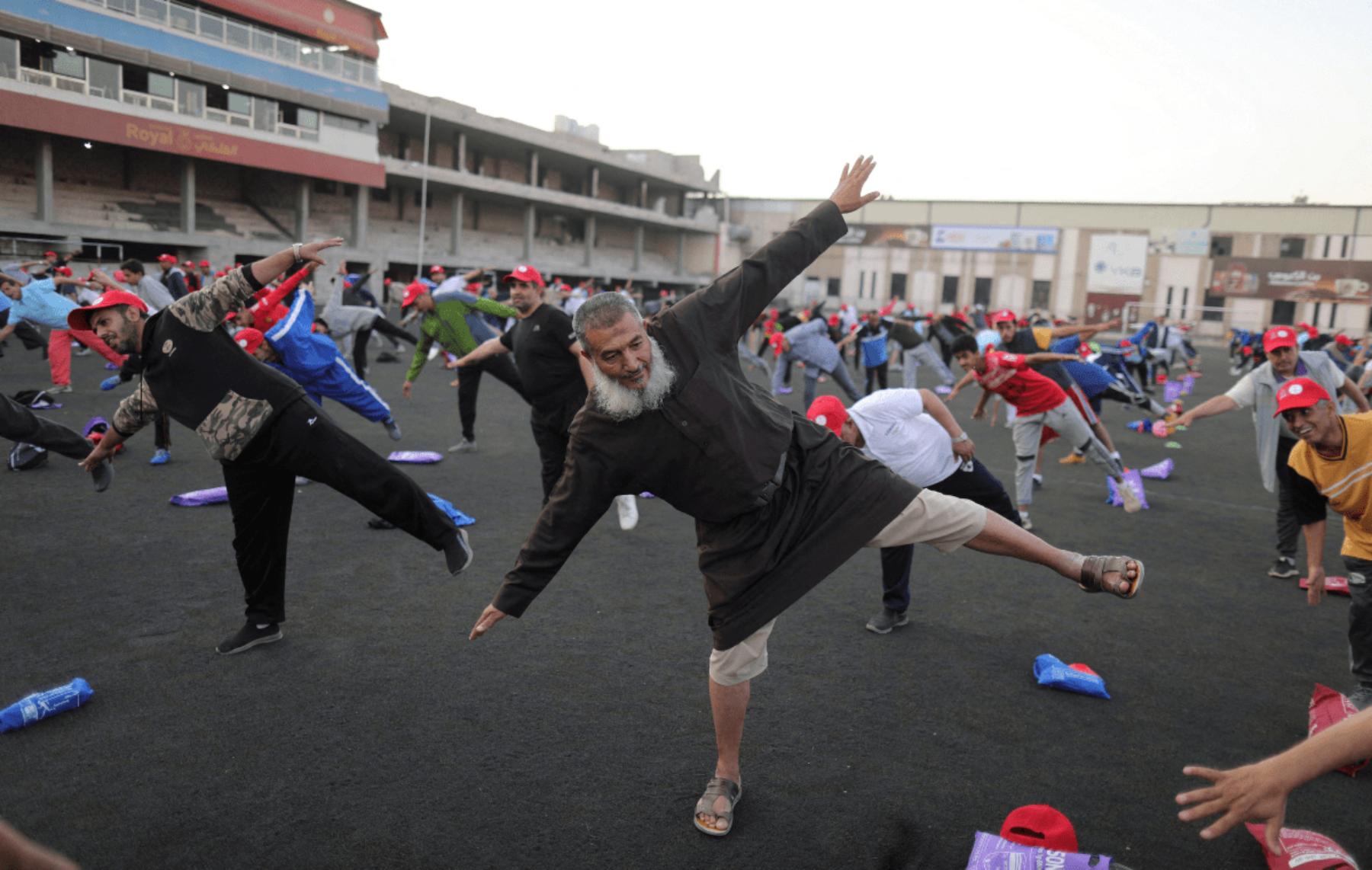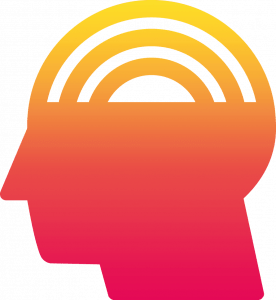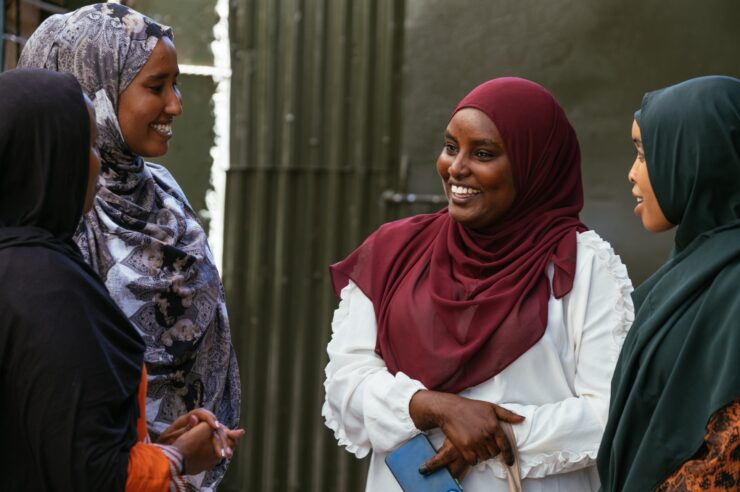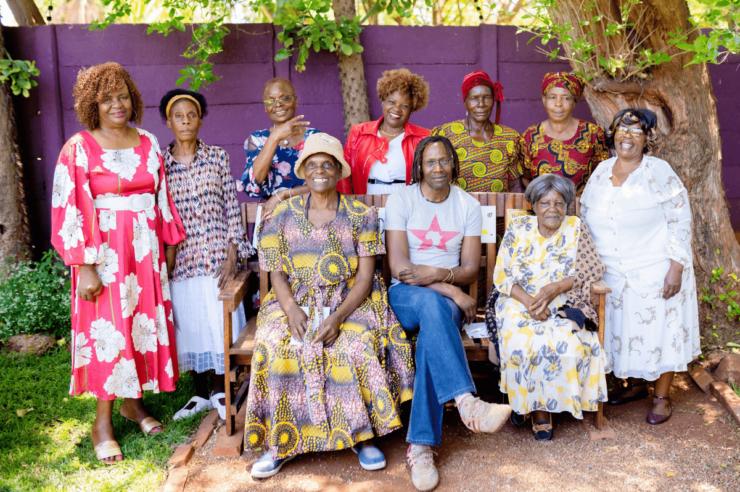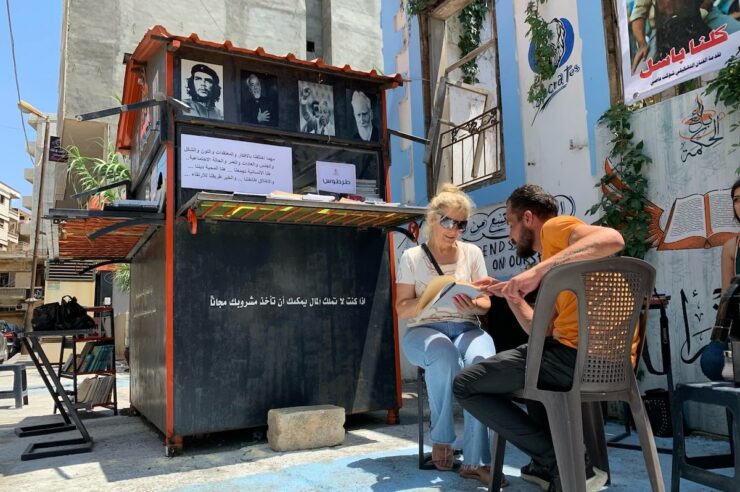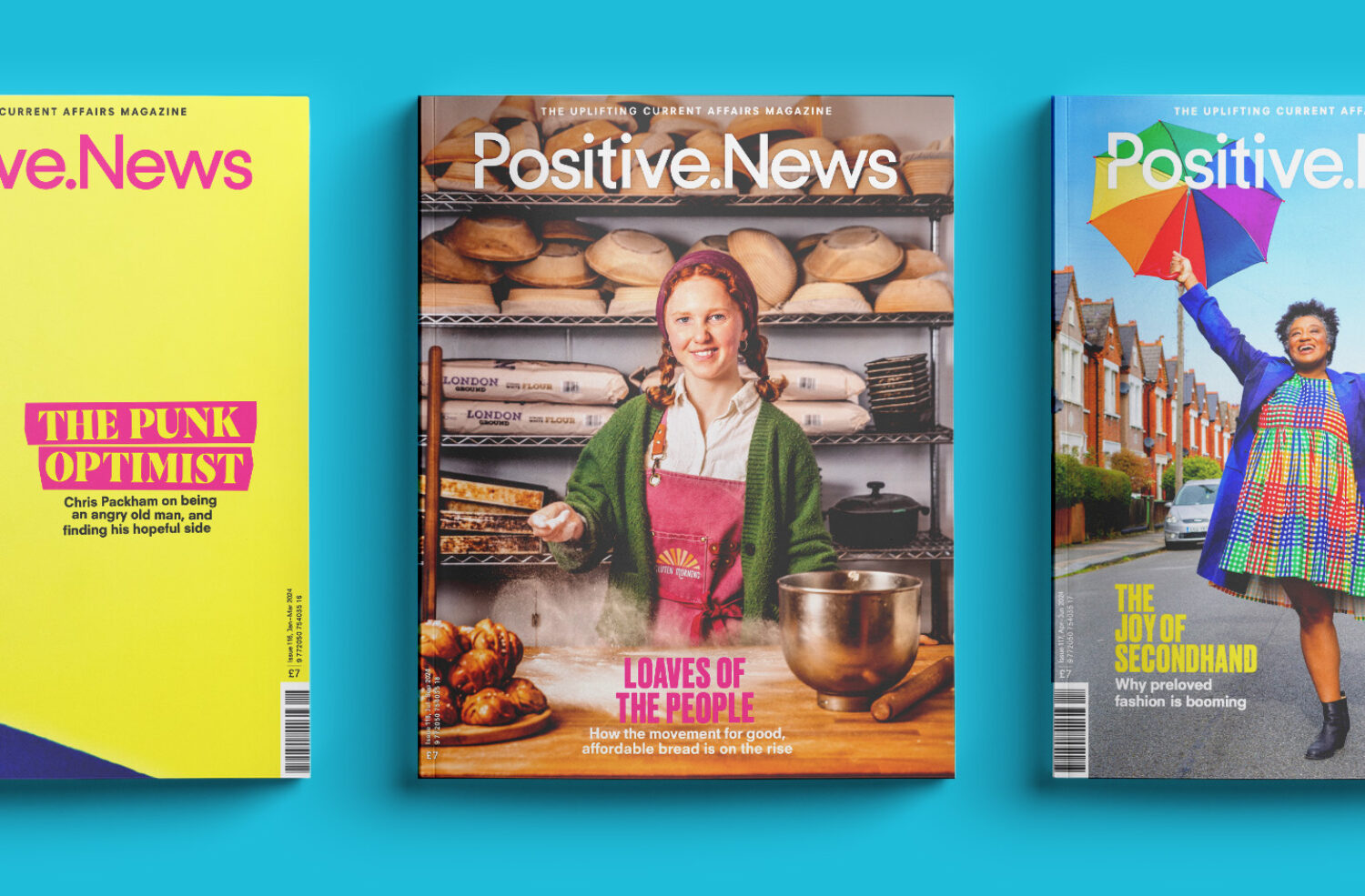How do you improve mental wellbeing amid war, famine and a collapsing health system? An elderly retiree in Yemen came up with a solution – a free, daily Swedish Gymnastics club, which has spread fast across the country
It’s 5am on Saturday morning as men begin to trickle into Sanaa’s al-Thawra Park after dawn prayers, taking in the day’s coolest breeze in an otherwise scorching Arabian Peninsula. By the time the sun casts its first beams on war-ravaged Yemen, hundreds of men will have taken their positions across the park, and the workout begins.
Enthusiastic chants of “Ahsan Fareek”, or “Best Team”, boom across the park as members of this daily, free, open-to-all sports club begin a set of 33 exercises designed to work the whole body. For the next hour, they temporarily put aside the stressors they’ve accumulated from the devastating eight-year civil war that has claimed 377,000 lives, touching their toes, standing on one leg and reaching for the sky.
By 6.30am the crowd disperses, and everyone goes about their day, rejuvenated and energized, ready to meet again the following morning. Some of the men go out for breakfast and a group of some 80 cyclists ride to the cascading waterfalls of Bani Matar, on the capital’s outskirts.
“It is a sports club for everyone, but it’s particularly vital for the elderly, who suffer from illnesses and anxiety and for whom treatment is unaffordable,” says Najy Abu Hatem, co-founder of the initiative. “Being part of Best Team lifts their morale and gives them free exercise classes in a healthy and social setting.”
In a country brought to its knees by war, years of violence have come hand in hand with a steep deterioration in mental wellbeing. The current instability began in 2015, when a Saudi-led coalition intervened in Yemen to resist advances of Houthi fighters, who seized control of the capital city Sana’a, home to 2.5 million people, and drove out the internationally-recognized government. The fighting continues to this day, and the average 25-year-old in Yemen has lived through 14 armed conflicts. Because of this, the World Health Organization estimates that one in four Yemenis, around 5.5 million people, suffer from mental health disorders requiring medical intervention.
Amid the world’s worst humanitarian crisis – according to the UN World Food Programme, which estimates that two-thirds of Yemenis go hungry every day – mental health is overshadowed. Although the country officially has a national health service, it has all but collapsed in recent years, meaning anxiety, depression and psychosis are often left untreated. The privately-run facilities that have sprung up to plug the healthcare gap charge prices that most can’t afford.
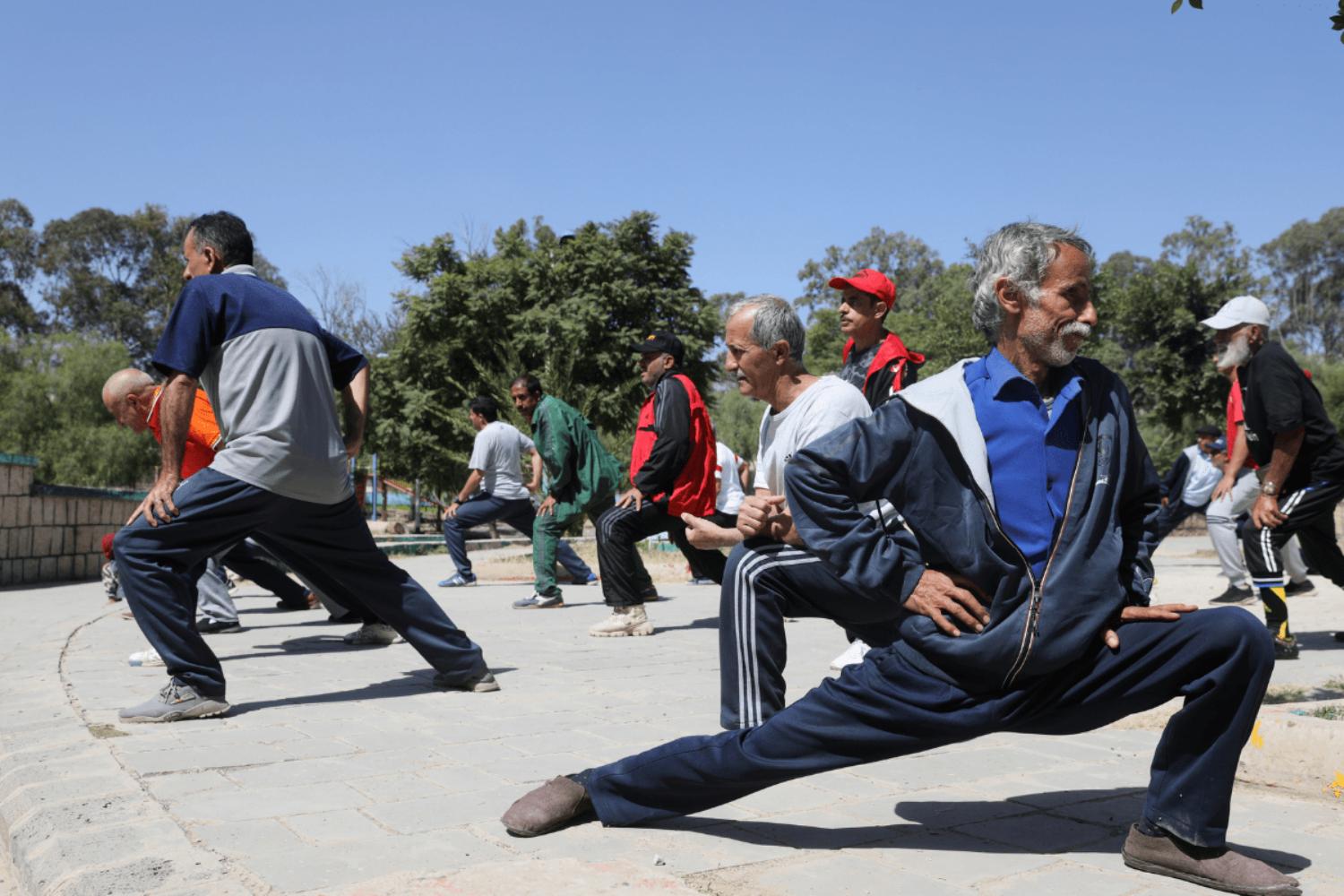
The classes are rooted in the tradition of Swedish gymnastics. Image: Reuters
In a country of 33 million people, there are only 59 psychiatrists – one psychiatrist per 500,000 people – and the total number of mental health workers is just 304. In a culture that associates mental disorders with jinn and witchcraft, psychiatric problems have become a taboo that most would prefer to overlook.
“Numbers aren’t available to prove it, but it’s unquestionable that mental health illnesses have soared, given everything Yemen is going through,” says Monira al-Nemr, head of the psychiatry ward at Al-Resala Hospital in Sana’a. “The social stigma with which mental conditions are regarded leads to many cases being brought in only when it’s too late.”
Although Best Team can hardly tackle this huge, ongoing mental health crisis, the twin benefits it provides of camaraderie and physical exercise – under the guise of a more socially acceptable men’s sports club – is nonetheless quietly improving people’s mental wellbeing across the capital and beyond, says Dr Al-Nemr. “Best Team provides profound mental support for those who take part in it, especially senior citizens brought together by exercise and companionship,” she says.
Breaking bad habits
It was in 2017, two years after Abu Hatem, who worked as an engineer, retired that he and another younger friend, Abdullah Al-Qaidani, started Best Team. Abdullah worked as a general director in the ministry of education. Abu Hatem sought a healthier life in retirement, having seen his friends sink into depression and dependency on al-khat – a locally grown stimulant herb that is classified as a drug in the US and Europe, but is a deep-rooted Yemeni tradition. Some studies estimate that roughly 90 per cent of Yemeni men chew al-khat and Abu Hatem himself used it daily in his youth.
“We started exercising early every morning, and then asked friends, colleagues and neighbours to join. We initially targeted retirees to help them abandon their daily routine of sleeping and chewing al-khat,” says the 73-year-old engineer. “It’s a lifestyle that decays the body and soul.”
And it worked. Early member Abdulqader al-Nahmi, a 62-year-retiree who worked in Yemen’s ministry of agriculture and irrigation, says he was motivated by the team to drop the daily ritual, as did Hatem Ali, a 77-year-old former army officer. As word of the obligation-free sports sessions spread – requiring no fees, no set venues, ages or uniforms, and banning all talk of politics or war – more and more people joined, and requests came for other clubs to open across the country.
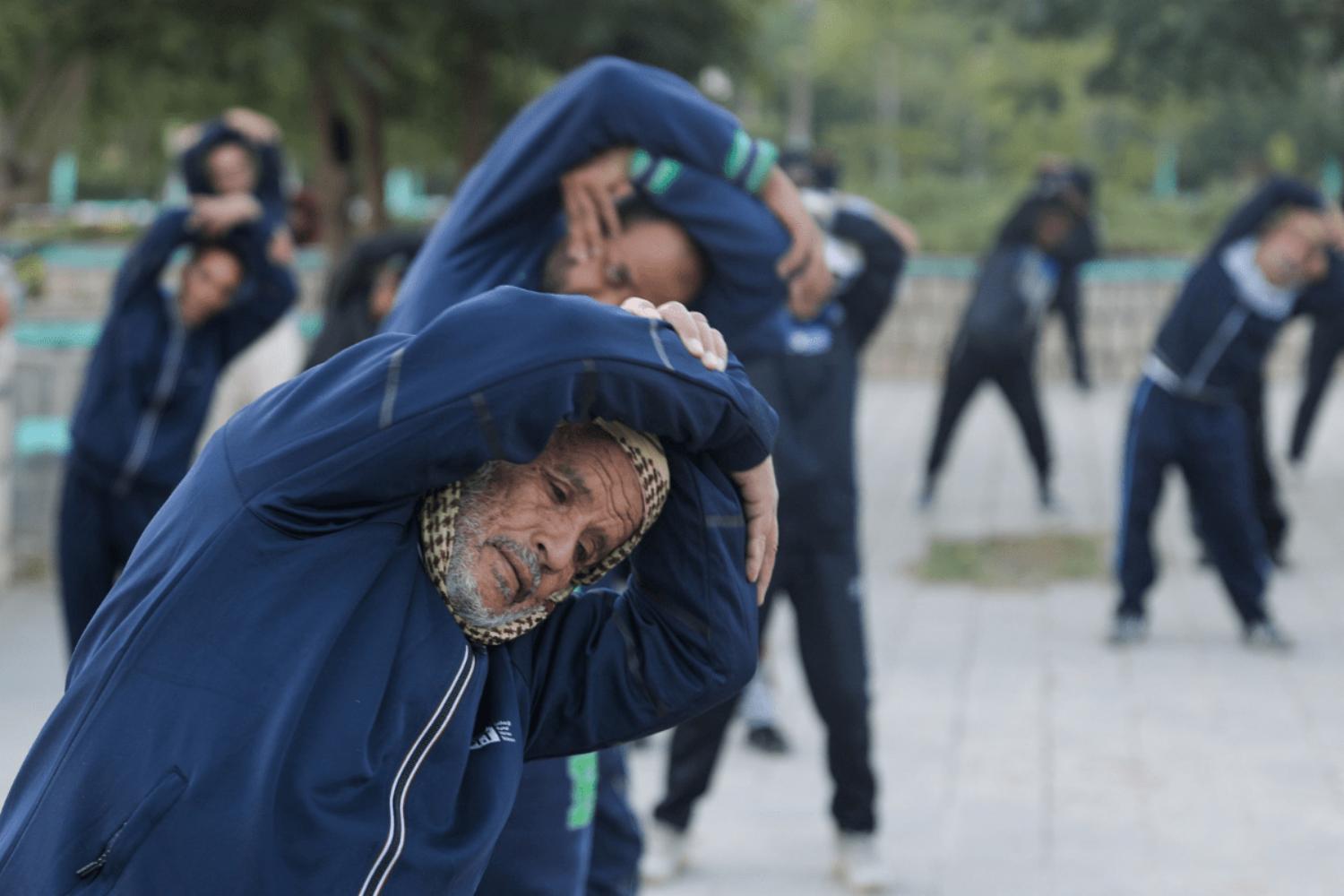
With just 304 mental health workers for 33 million people, the classes are a rare wellbeing lifeline. Image: Reuters
Forty seven per cent of Yemenis survive on less than $2 a day, according to World Bank data, and gym memberships – which range between 4000 to 20,000 rials ($7-35) – are an exorbitant cost for most. After the war began, many gyms shut down because without any clientele, they could no longer cover their expenses, said Amer Hamid Doghaish, owner of Olympic sports club.
It was into this vacuum that Best Team found a groundswell of popular support. From two members, the club now has over 1,500 members of all ages and walks of life, who meet on a daily basis across 17 branches, 14 of which are in Sana’a.
The newest branches started in June in Hajja, a city northwest of Yemen. When enough people submit a request for a branch to open at a particular location, the team’s founders dispatch a veteran member to guide the workouts.
It’s the clearest example of how we remain united as a nation
Best Team has a committee of long-standing members who do regular check-ups on all branches to ensure they are safely following the Swedish Gymnastics routine. First developed in the early 1800s, the simple sequence is designed to keep the whole body in good health and is still widely used today. The Best Team founders came across it on the internet and had the routine fine-tuned by fellow member Khaled Ward, who once served as the chief trainer at Yemen’s military college, ensuring that it works for those of all ages and in varying states of health.
Since Ahmed al-Mejahed, an advisor to Yemen’s National Association for Retired People, launched Best Team’s fifth branch, he says his life has improved. “Swedish exercises revitalise your body, but it’s the people who deeply move you,” he says. “You’d see those who once weren’t able to walk unsupported, or had severely slouched backs, or those who faded beneath life’s pressures and anxiety, but all are feeling healthier and happier. It’s beautiful.”
There is however, 50 per cent of the population who are excluded from accessing Best Team. In Yemen’s conservative society, governed by deeply-rooted pastoralist and tribal traditions, strict gender roles restrict women’s freedom, including their ability to exercise in public.
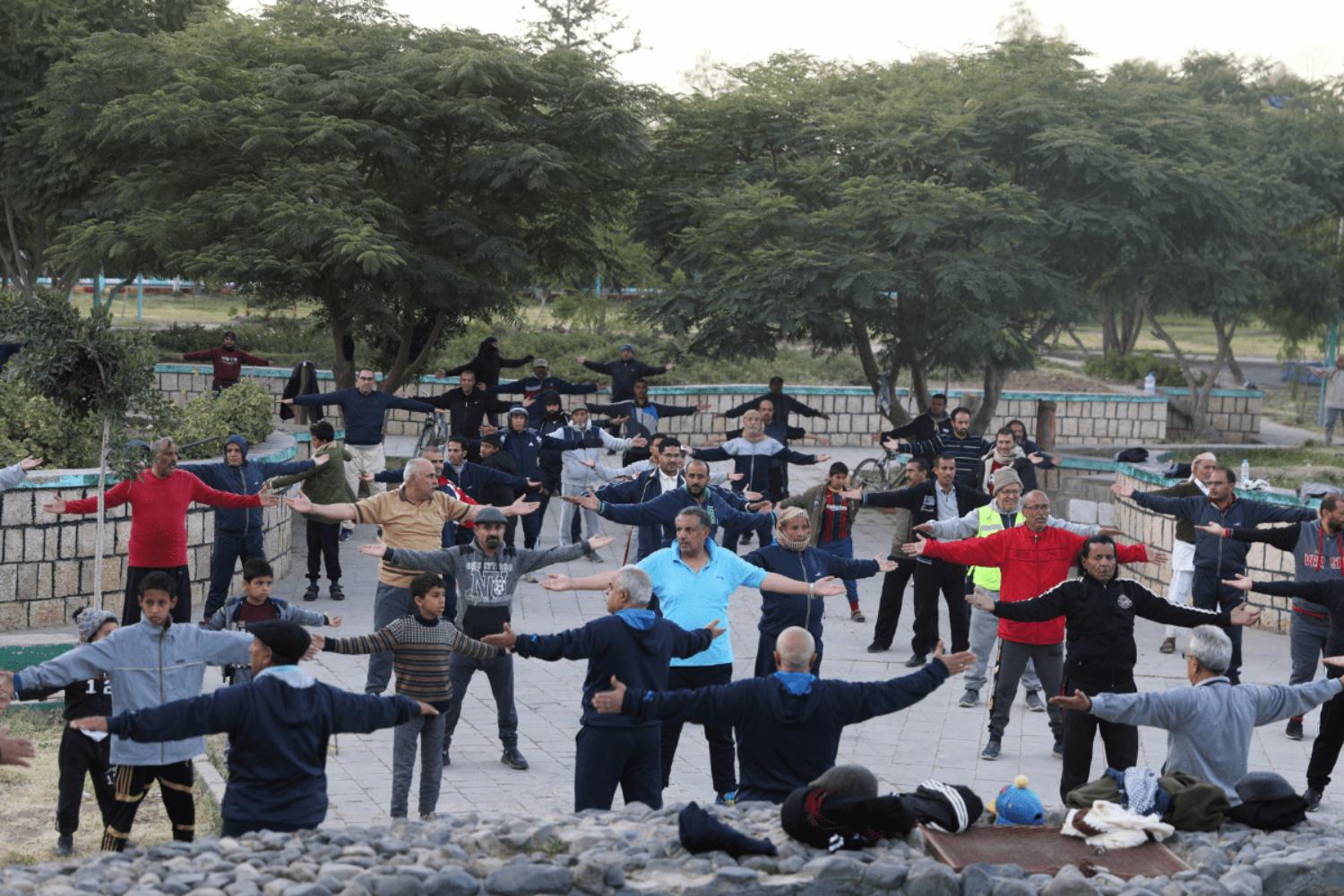
Best Team now has branches all over Yemen, but there is a notable absence of women. Image: Reuters
Amani Mahmoud, a 40-year-old government employee, says Yemeni women are in desperate need of such support. “I wish we as Yemeni women have our own version of Best Team,” she says. “We need it just as much to be able to get by the daily stressors of war. We need sports and togetherness. It’s unfortunate that we are left out just because of societal restrictions.”
Despite the lack of gender diversity, there is however an impressive array of professions, classes and ages reflected in the ranks of Best Team. It is this which 80-year-old former parliamentarian Saleh al-Sayel finds so powerful.
“When I was first invited to join, I hesitated, but once I tried I realised what an incredible team it is,” he says. “I have not missed one day of workout in the past year. Each one of us found himself in Best Team – and we found every other Yemeni among us. It’s the clearest example of how we remain united as a nation.”
This story was published in collaboration with Egab.
Main image: Reuters
 Developing mental wealth is a series produced by Positive News and funded by the European Journalism Centre, through the Solutions Journalism Accelerator. This fund is supported by the Bill & Melinda Gates Foundation
Developing mental wealth is a series produced by Positive News and funded by the European Journalism Centre, through the Solutions Journalism Accelerator. This fund is supported by the Bill & Melinda Gates Foundation
Help us break the bad news bias
Positive News is helping more people than ever to get a balanced and uplifting view of the world. While doom and gloom dominates other news outlets, our solutions journalism exists to support your wellbeing and empower you to make a difference towards a better future. And as Positive News’ audience and impact grows, we’re showing the rest of the media that good news matters.
But our reporting has a cost and, as an independent, not-for-profit media organisation, we rely on the financial backing of our readers. If you value what we do and can afford to, please consider making a one-off or regular contribution as a Positive News supporter. Give once from just £1, or join 1,000+ others who contribute an average of £3 or more per month. You’ll be directly funding the production and sharing of our stories – helping our solutions journalism to benefit many more people.
Join our community today, and together, we’ll change the news for good.
